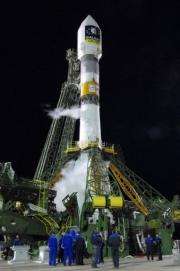EU Galileo satnav system to begin operations in 2014

The EU's much-delayed Galileo sat-nav network will begin operation in 2014, the European Commission said Thursday as it awarded key contracts to Germany's OHB System and France's Arianespace.
The European system is aimed to challenge the dominance of the US-built Global Positioning System (GPS), set up by the Pentagon in the 1980s, which is widely used in a huge variety of navigation devices like those in cars and boats.
OHB System beat out larger rival EADS-Astrium for the contract to build the first 14 satellites for the 30-satellite navigation system, EU Transport Commissioner Antonio Tajani said, with Arianespace providing the launch services.
The first satellites will be launched from French Guiana by Russian Soyuz rockets.
Franco-Italian group Thales Alenia Space was handed the contract to provide system support services.
"This will allow the initial deployment and service provision of Europe's satellite navigation system as of early 2014," Tajani said.
"With this and the upcoming awards for the remaining procurement packages, we are concluding a critical phase of the Galileo programme.
"We can now focus on the actual roll-out and demonstrate to European citizens that Europe's own satellite navigation system is firmly underway," he added.
The EU has struggled to secure financing for the project, originally put at 3.4 billion euros (5.4 billion dollars), and has had to tap unused funds from the bloc's massive agricultural budget.
Tajani said there was bound to be an increase in the budget, especially as regards the costs of the launchers, but could not provide a figure.
Last year, the European Court of Auditors criticised the Galileo project as ill-prepared and badly managed.
The commission said some services would be available by early 2014, including the "open service," which will be freely available to the public in Europe, just as the US GPS system is.
Also available early will be the search and rescue service.
Galileo is intended to offer a superior accuracy of one metre (yard), compared to up to 10 metres for GPS, making it very useful for car drivers, farmers and even the blind.
The European version will have global coverage and an encrypted, pay service for commercial clients, with extra information such as weather detail.
The OHB contract for 14 satellites is worth 566 million euros.
The commission offered hope to EADS-Astrium by stressing that subsequent satellites will be procured "each time" from OHB or EADS-Astrium "depending on which company provides the most advantageous offer."
EADS-Astrium had already secured the contract for a preliminary four satellites, which will be among the first launched.
Since the launch of the bidding process, EADS has also taken over Surrey Satellite Technology, a partner with OHB in its successful bid.
The contract with Arianespace covers the launch of five Soyuz launchers with the first lift-off scheduled for October 2012. The contract is worth 397 million euros.
The contract awarded to Thales Alenia Space, worth 85 million euros, for the system support services covers the industrial services needed to support the European Space Agency for the integration of Galileo.
Remaining procurement contracts, for the ground mission infrastructure, the ground control infrastructure and operations should be awarded by mid-2010.
(c) 2010 AFP


















